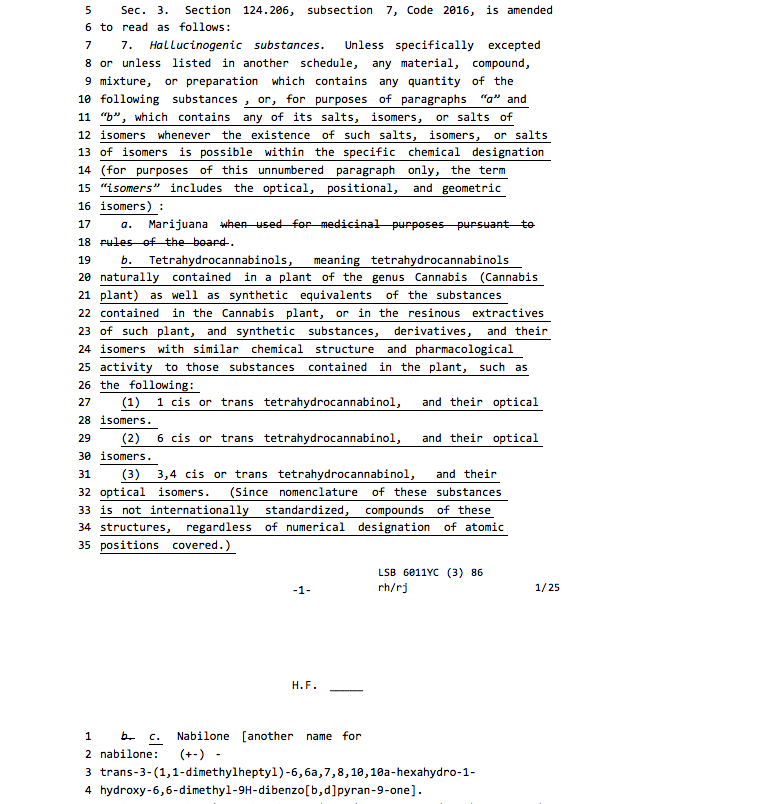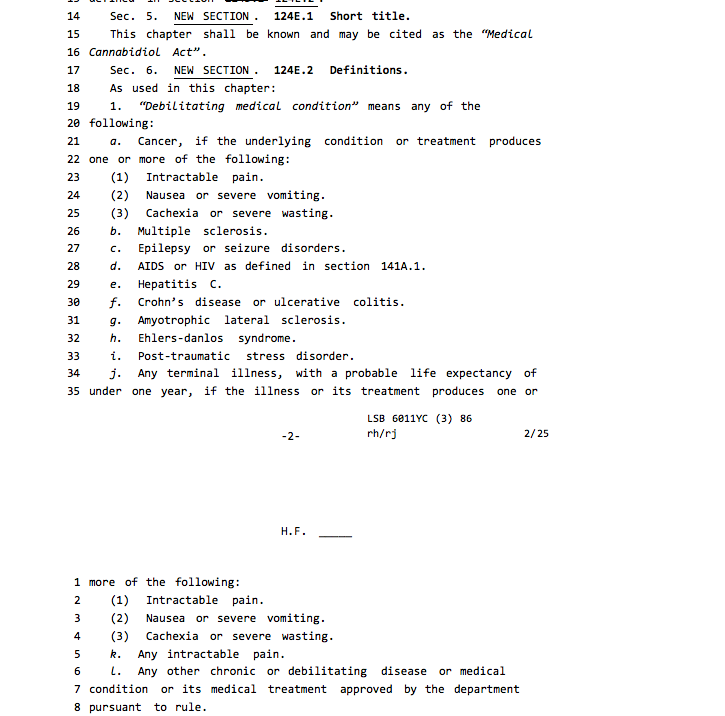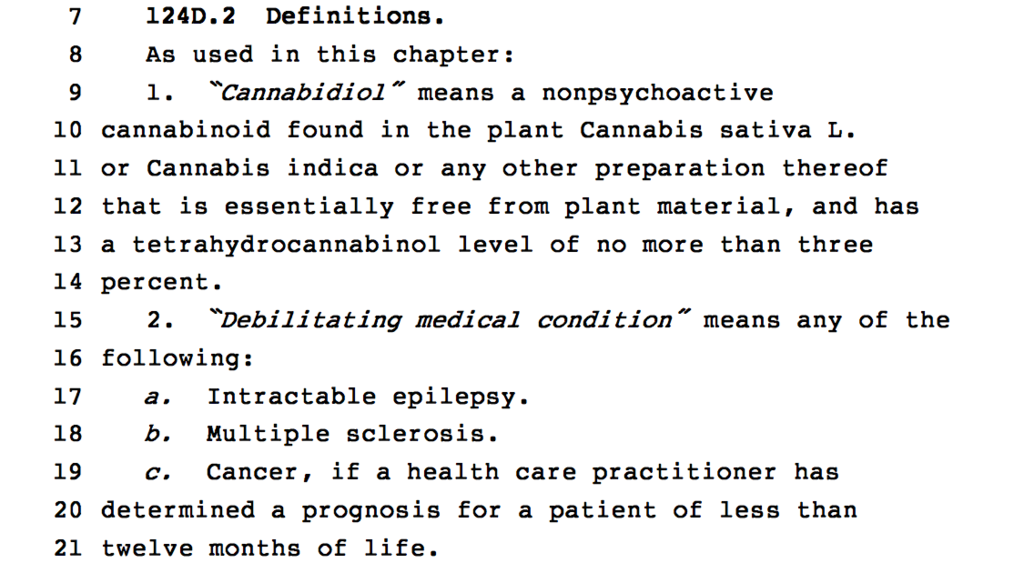Iowa House Republicans have substantially altered a bill that would expand the legal uses of cannabis derivatives to treat certain illnesses. State Representative Peter Cownie introduced the bill last week, but an amended version was presented at a subcommittee hearing today without explanation. Follow me after the jump for background and details.
In the final hours of the 2014 legislative session, Iowa lawmakers adopted the state’s first bill to legalize cannabis oil for treating certain seizure disorders. Governor Terry Branstad signed that bill into law, but its limitations have prevented thousands of Iowans suffering from severe or chronic illnesses from getting relief. Even for people whose medical conditions qualify for using cannabis oil, access is a problem, since Iowa has no dispensaries. Families who travel to other states to obtain cannabis oil lack a legal means of bringing the product home.
Last year, Iowa Senate Democrats proposed expanding the law to make various forms of cannabis derivatives (but not smokeable marijuana) legal for treating “debilitating medical conditions” such as cancer, multiple sclerosis, epilepsy, AIDS or HIV, glaucoma, hepatitis C, Crohn’s disease or ulcerative colitis, Amyotrophic lateral sclerosis (often known as Lou Gehrig’s disease), Ehlers-danlos syndrome, or post-traumatic stress disorder.
The Senate approved Senate file 484 last April on a mostly party-line vote of 26 to 19 (roll call). Senator Brad Zaun was the only Republican to support the bill; Senator Tod Bowman was the only Democrat to vote against it. The Iowa House referred the bill to the Public Safety Committee, where no action was taken before legislators adjourned for the year. Various organizations advocating for people with illnesses that might be covered lobbied for that bill, while the Iowa Medical Society and Blank Children’s Hospital in Des Moines lobbied against it.
I heard many rumors during the 2015 session about this or that House Republican who supposedly favored expanding the medical cannabis law. None of those alleged closet supporters was willing to comment on the record about his stance, though. Most of the GOP state representatives I contacted about this issue did not respond to my inquiries at all, including State Representative Peter Cownie. I found that strange, since West Des Moines Mayor Steve Gaer and his wife Sally Gaer are Cownie’s constituents as well as among Iowa’s most vocal supporters of wider access to medical marijuana. (The Gaers’ daughter suffers from a severe seizure disorder.)
Cownie told me recently that he had voted for a Democratic motion to suspend the rules to bring the medical cannabis bill up for a vote during the closing days of the 2015 legislative session. I have not been able to find a roll call for that vote but will update this post if possible.
Last week, Cownie announced plans to introduce his own medical cannabis bill. He filed House Study Bill 607 on February 10 in the House Commerce Committee, which he chairs. Its original text strongly resembled language from last year’s SF 484.
HSB 607 was referred to a House Commerce subcommittee. Its three members are Republican State Representatives Guy Vander Linden and Zach Nunn and Democratic State Representative John Forbes, a pharmacist who has long supported expanding access to medical cannabis.
The subcommittee met at noon today, but sometime last night or this morning, an amended text was substituted for Cownie’s original bill. The new text drastically reduces the number of illnesses that may be treated with medical cannabis and maintains the current ban on using any derivative besides cannabis oil. At this writing, it’s unclear who ordered the bill to be amended. Cownie has not yet responded to my requests for comment. Forbes posted on Twitter that Vander Linden “stated at the beginning of the [subcommittee] meeting that the bill has been amended. That’s it.”
Here is the original language from House Study Bill 607 on types of allowable cannabis derivatives:
Here is the original language from House Study Bill 607 on conditions that could be legally treated with cannabis derivatives:
Excerpt from the amended version of House Study Bill 607, presented to lawmakers today:
Note that only patients with “intractable epilepsy,” multiple sclerosis, or cancer with a prognosis of less than 12 months to live would be able to access cannabis oil under the revised bill. My mother’s oncologist advised her to obtain marijuana to help alleviate side effects from chemotherapy more than 35 years ago. To my knowledge, she had not been given a specific life expectancy at that time. Why restrict the use of medical marijuana to cancer patients considered terminal, when so many could benefit from using it during the early stages of their treatment?
House Speaker Linda Upmeyer has long opposed expanding Iowa’s medical cannabis law. No one has yet explained to me how a nurse practitioner by training can be so indifferent to the suffering of Iowans with many illnesses that could be treated with cannabis. Doctors have been quietly recommending its use for decades. We don’t ban medications like opioid pain relievers, even though thousands of Iowans abuse those.
Claire Celsi, the Democrat running against Cownie in House district 42, told me she attended a candidate forum in Waukee on February 6, where she asked Republican State Representative Rob Taylor if he would introduce a bill on medical cannabis. “He said no – because Speaker Upmeyer had already told them it was going nowhere this year.” Taylor did not respond when I sought to confirm his statement at that forum.
When I asked Cownie whether Upmeyer had told him and other House Republicans that there was no hope of passing a medical cannabis bill this year, he replied by e-mail on February 9, “Speaker Upmeyer has not told me that and I have had several conversations with her on the issue. The bill will be assigned tomorrow and my preference would be for a subcommittee to meet this week.” Noting bipartisan support for the measure, he said, “I hope we can get something done this year.”
However, Upmeyer spoke to Radio Iowa’s O.Kay Henderson on February 12, confirming that she opposed Cownie’s bill:
“I still really believe that the FDA is the arbiter of what is a medication,” she says, “and making sure that the safety, the quality — all those things is the same for any medication.”
Upmeyer says Iowa doctors worry they’ll lose their licenses write prescriptions if they advise patients to use marijuana as treatment for a medical condition.
“Physicians that hold DEA licenses have just a real bit of a concern or a large concern over whether or not that jeopardizes those at all,” Upmeyer says.
And Upmeyer says on January 20th of next year when a new president takes over, the federal approach to medical marijuana may change.
I am seeking further information on several angles:
1. Who ordered Cownie’s bill to be amended before today’s subcommittee meeting?
2. Are House leaders on board with a bill that allows cannabis oil only (no other derivatives) to be used to treat three illnesses only?
3. Are Democrats in the Iowa House and Senate willing to go along with such a limited expansion of access to medical cannabis? Forbes voted for the amended bill at today’s subcommittee. It passed unanimously but needs to be approved by the full Commerce Committee by Friday to make it through the legislature’s first “funnel” deadline. I am seeking comment from Senator Joe Bolkcom, the upper chamber’s leading advocate of medical cannabis for the last several years.
Forbes live-tweeted today’s subcommittee hearing, where people affected by diseases covered in the original bill under but not the amended version argued passionately against leaving them out in the cold. A woman whose mother died of ALS called it “inhumane” to exclude that disease from the list of conditions allowing access to medical cannabis. Someone suffering from Guillan Barre syndrome doesn’t like the prescription drugs currently available for the disease and noted, “Nobody has died from marijuana.”
The amended bill also restricts the number of dispensing sites in Iowa to two; at today’s meeting, one medical cannabis supporter wondered whether that would be sufficient.
Any relevant comments are welcome in this thread.
UPDATE: Later in the day on February 17, the House Commerce Committee approved this bill by 17 votes to 6.
The following state representatives voted to pass the bill out of committee:
Gary Carlson (R)
Peter Cownie (R)
David Dawson (D)
John Forbes (D)
Chris Hall (D)
Chuck Holz (R)
Dave Jacoby (D)
Bobby Kaufmann (R)
Bob Kressig (D)
Jim Lykam (D)
Brian Meyer (D)
Zach Nunn (R)
Jo Oldson (D)
Scott Ourth (D)
Ken Rizer (R)
Guy Vander Linden (R)
Ralph Watts (R)
The following representatives voted against passing the bill out of committee:
Chip Baltimore (R)
Pat Grassley (R)
Steve Holt (R)
John Landon (R)
Dawn Pettengill (R)
Tom Sands (R)
SECOND UPDATE: Speaking by phone on February 17, Vander Linden confirmed that he and Nunn started working on the amendment after the cannabis bill came to him as Commerce subcommittee chair on February 11. The new language was “based on what we thought could pass” the House, where many in the Republican caucus are against any broader access to cannabis derivatives. I asked whether the Iowa Medical Society (the main advocacy group representing doctors in this state) had been involved in choosing which diseases and medical conditions would be included in the amendment. Vander Linden indicated that the list of three conditions did not come from the Iowa Medical Society; rather, he and supportive colleagues were looking for language that “has the best chance of passing,” and “the longer the list, the harder it is to get it passed.” By way of example, he said many House Republicans opposed making cannabis available to people with PTSD, which was in the original draft. He noted that the Iowa Medical Society is still registered as opposed to the bill but did not have a representative speak against it during the subcommittee meeting.
Asked why multiple sclerosis was included in the amendment while amyotrophic lateral sclerosis (ALS) was not, Vander Linden acknowledged it was “more arbitrary than anything else,” adding that he and others are trying “to pass something that would help some people.” He also confirmed my impression that the new language would not permit a cancer patient in the early stages of treatment, with no terminal diagnosis, to obtain cannabis as relief from nausea related to chemotherapy.
Vander Linden said he and other House Republicans “have not consulted with the Senate at all” on this amendment. I will update this post again if and when key Democratic senators comment on the revised proposal.
Vander Linden told me House leaders have not promised him that they would bring the new version of the medical cannabis bill to the floor. He mentioned that because the cannabis bill involves some fees, it must go through the House Ways and Means Committee first. That could be a big hurdle, since Ways and Means Committee chair Sands voted against the bill in the Commerce Committee.
THIRD UPDATE: Speaking to the Des Moines Register’s Brianne Pfannenstiel, Baltimore explained his opposition to the measure:
Rep. Chip Baltimore, R-Boone, served on the full committee and was one of the six Republicans who voted against the legislation. He said that medical cannabis is still illegal under federal law.
“We’re a nation of laws. We need to understand that and respect it,” he said. “And as hard as it is to cast a no vote when the obvious evidence is that people may be helped, we have a greater duty to a greater system than that. And that’s why I will continue to encourage our federal officials to change the classification (of marijuana as a Schedule 1 drug), but until they do, it’s a challenge for me to vote in favor of (the proposed bill).”
About two-dozen individuals spoke spoke at the subcommittee meeting, with all but two in support. They told personal stories of the debilitating conditions they or loved ones have faced and urged the lawmakers to pass the bill and to consider expanding the number of conditions it would cover. […]
The few detractors urged caution in moving forward with legislation that could make it easier for young people to gain access to recreational marijuana.
Forbes said he does not think that’s a major concern and cited an article in the Lancet Journal of Medicine, which found that marijuana use among youth did not increase substantially after states adopted medical marijuana laws.
Celsi commented on her campaign’s Facebook page,
The “revised” medical cannabis bill is not sufficient to meet the needs of Iowans. It’s fundamentally unfair to the many people with “uncovered” conditions, woefully inadequate in its coverage of the state with the reduced number of proposed dispensaries, and completely unsympathetic to the people who need help the most. The bill does not address the science behind how “smokeable” medical cannabis helps conditions like anxiety and PTSD. Also disturbing is the backroom removal of language from the bill. Not even the committee members knew it was missing at first, and not one of them had even read the drastically revised language. I fully support Margaret Gaer’s quest for medication. Her suffering and the struggle her parents have gone through are well documented. But it is irresponsible to randomly exclude such large groups of sick people just to “get a bill to pass.” Indeed, it is still not at all a sure thing whether it would pass Ways and Means in the Senate or pass unscathed past the Speaker’s desk or the Governor’s veto pen.
What kind of public servant does these things in secret? It shows a deep lack of respect for the process and a lack of courage to stand up for what is right. I agree that the opponents of the bill are misguided in their assertions, but vilifying them will not help our cause. We simply must find more people that agree with us. I can’t support the revised version. I don’t think it helps to put a completely flawed process in motion – it’s no longer a “foot in the door,” in my opinion. It’s simply bad public policy. The 2014 bill was also a “foot in the door,” but completely unworkable. The conditions that made that bill completely unworkable still exist. Nothing has changed. This is still a half measure.
MARCH UPDATE: House Study Bill 607 was renamed House File 2384. At this writing, the Ways and Means Committee has not acted on the legislation.





4 Comments
what's the point
I haven’t been actively involved in this issue but I find this bill pitifully inadequate to provide the kind of relief it was obviously designed to. Ridiculous.
laurenwhitehead Wed 17 Feb 3:18 PM
I'm tempted to say...
…..follow the money. I’m not an expert but I’ll be surprised if the “mystery Amendment gremlin” wasn’t someone with pretty deep ties to big pharma. A restricted list of eligible ailments says Pharma didn’t want to lose market share to (generally) cheaper MM. This serves as a rather sad bookend to the WellCare/privatization grift being perpetrated on Iowans. Iowans seem to have been sold out when it comes to their healthcare.
As far as MM, I’d say repubs are petrified this issue could come to a vote/referendum/ballot measure/proposition. I think voters themselves would act with more humanity than this current crop of cowardly congress critters.
I hope you get some answers to your questions.
dbmarin Wed 17 Feb 11:43 PM
I sat through the original cannabidiol testimony in Senate Commerce a couple years ago
I was there for another bill, but I learned a lot that day, and I can’t understand why there are any legislators who are still against it. More than that, I don’t understand why they aren’t working to fix the problems with the current law, and trying to help more people. Isn’t that what they were elected to do?
One alternative I’ve never heard actively pursued is having one of the Iowa-based tribes grow and process the type of a marijuana to produce cannabidiol, and dispense it on tribal land (within Iowa, so no one would need to cross state lines). I thought I had read a document from the Department of Justice that essentially gave the tribes some leeway in that area (and especially if they’re only growing a variety not high in THC, and only selling it in oil form, it would seem lower-risk). That certainly seems like a lucrative business opportunity. Of course, it carries more risk than casino operations. 😉
If this bill could get to the floor, there would be a lot of amendments, and opportunity to add in other ailments. I don’t think it will get brought up in Ways & Means, though I hope I’m wrong. At least as a Ways & Means bill, it isn’t subject to funnels. Lots of time to lobby.
x Thu 18 Feb 1:55 PM
Iowa must have a Whole Plant Medicine Bill. SF 484
Iowa must have a comprehensive medicinal Cannabis bill that legislates whole plant medicine. CBD oil only bills that exclude medical conditions that science and research have proven to benefit sick and dying human beings are nothing but cruel political stunts. I am literally the only medical professional in the entire state of Iowa certified or trained in dosage and administration and interventions of Cannabis medicine. Politicians with no knowledge or training or education should ask for help and guidance before making laws that cause harm and exclude entire patient populations, while ignoring evidence based practice, medicine and established science worldwide. Respectfully, Shelly Van Winkle, RN, Certified Cannabis RN, ACNA, Founder Director, Iowa Hemp Association, ACNA State Meet up Director Iowa, Illinois
LimitlessRN Thu 18 Feb 2:26 PM